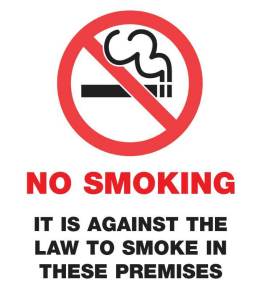NO SMOKING POLICY
Smoking is banned in spectator areas at public sports grounds and other recreational areas in NSW. However, smoking will only be banned when an organised sporting event is being held.Major sporting facilities are included under the definition of public sporting ground and will be required to comply with the new law. Other outdoor sporting facilities, such as local Council playing fields, are also covered by the new law.
Will smoking be banned only in spectator areas which are covered?
No. The smoking ban applies to all spectator areas at sports grounds and other recreational areas when they are being used for an organised sporting event. The law applies to both covered and uncovered spectator areas and whether seating is provided or not.
Will the ban only cover the time that the players are competing?
No. The smoking ban applies during the entire duration of the organised sporting event. This will include not just when the players are competing but pre match and half time games and entertainment that form part of the sporting event.
What is a spectator area?
A spectator area is an area set aside for or being used by spectators to watch an organised sporting event at a sports ground or other recreational area, but only when an organised sporting event is being held there.
Why is this new Act in place?
Public sports grounds are a popular public outdoor setting for exercise and recreation and often attract large numbers of people, particularly families with children. There is no safe level of exposure to second-hand tobacco smoke. This is the smoke which smokers exhale after inhaling from a lit cigarette. In adults, breathing second-hand tobacco smoke can increase the risk of cardiovascular disease, lung cancer and other lung diseases. It can exacerbate the effects of other illnesses such as asthma and bronchitis. Exposing ex-smokers to other people’s tobacco smoke increases the chance of relapsing to smoking.
For children, inhaling second-hand tobacco smoke is even more dangerous. This is because children’s airways are smaller, and their immune systems are less developed which makes them more likely to suffer negative health consequences of second-hand tobacco smoke such as bronchitis, pneumonia and asthma.
Creating smoke-free outdoor areas, such as in public sports grounds and recreational areas, can provide a supportive environment for those who have quit and make smoking less visible to children and young people.










